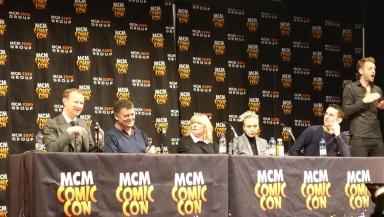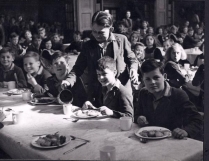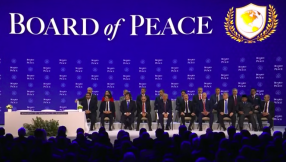
I can't remember seeing this many aliens in one place ever before. It was like a massive version of Star Wars' Mos Eisley Cantina with every conceivable type of extra terrestrial you could imagine. I visited Comic Con London this year, a mammoth invasion of comic book, fantasy and science fiction fans into the Excel Centre. This year's event welcomed 130,560 people over one weekend making it the third largest Comic Convention in the world. Unlike me, most of the visitors were wearing elaborate costumes depicting characters from video games, Japanese animations, science fiction movies or cartoon series. I was struck by the friendliness - those who had spent the most time dressing up were very willing to stop for a conversation and a selfie. One young person I was accompanying to the event commented: "I have finally come home. Finally somewhere I belong."

After relentless queuing I found myself sitting on the front row of an in-depth discussion with Steven Moffat, the showrunner, writer and producer of Doctor Who. Next to Moffat was Mark Gatiss the co-creator with him of the rebooted BBC series Sherlock. After revealing the air date and time of the Christmas special "The Abominable Bride" (January 1, 8pm BBC one, if you're interested) there was some time for questions from the floor. The first few showed a level of knowledge of the Dr Who canon that would put to shame many Christians' knowledge of the scripture. There were detailed questions about continuity, urgent pleas for beloved old characters to be resurrected and inquiries about intimate details of the characters' lives. Thinking this might be the closest I get to a genuine science fiction genius I sprinted for the microphone. Unusually I was nervous: I like Dr Who and Sherlock but this crowd loved them.
I had been thinking for a while about the similarities between the detective and the doctor, so here's what I asked:
"Firstly thank you for helping to reboot Dr Who and Sherlock. Secondly I wonder if Sherlock and Dr Who would be friends as they seem to have a lot in common. They are both intellectuals who overcome their enemies with their brains rather their braun. They are both also very committed in their friendships, (apparently more committed to friends than family or romantic interests). Are you trying to redeem the intellectual and friendship again?"
Steven Moffat: "That's a big question. I hope friendship and intellectualism don't need redeeming. But I don't know if the eternal question of the crossover is coming up there. It's not going to happen. Qualities in common... they do. But that doesn't mean they are going to like each other. It doesn't mean they will get on. One other quality they have in common; though the Doctor would never admit it but Sherlock would, is they really quite like being the cleverest person in the room. If they both turned up they would they would say 'This was mine. I am covering this one. I don't need you. I am being really interesting and slightly annoying - you go off and do really interesting and slightly annoying somewhere else with your stupid screwdriver'."
As Moffat was speaking and the appreciative crowd were laughing along I had a thought about the nature of free will and predestination. Moffat is the one determines how these characters will live and move and have their being. He is, in one sense, God in these two fictional universes. Yet even in this brief exchange you can hear how well Moffat knows and understands his characters, they have an integrity of their own and Moffat as director guards their identity and consistency in the way that he makes plans for them.
In this relationship between author and characters I think we see a little glimpse of the sovereignty of God and the free will of humanity. The Bible teaches that God is the ruler over all of the universe, for examples in Isaiah 46:9-10 he clearly states:
I am God, and there is no other;
I am God, and there is none like me.
I make known the end from the beginning,
from ancient times, what is still to come.
I say, "My purpose will stand,
and I will do all that I please."
But equally the Bible teaches that human beings have free will; that our decisions make a difference. So in Romans 10:11-13 Paul writes:
'Everyone who believes in him will not be put to shame.' For there is no distinction between the Jew and the Greek, for the same Lord is Lord of all, who richly blesses all who call on him. For everyone who calls on the name of the Lord will be saved"
This is a paradox. Holding on to these two aspects of the Bible's teaching is difficult but my close, but brief, encounter with Moffat gave me a different perspective on how to connect these two perspectives.
As I left the Comic Con event it was strange to be crammed into a DLR carriage with aliens, zombies and cartoon characters. Rather than the usual Great British silence on public transport there was a buzz of conversation and laughter. I remembered the comment "finally, a place where I belong" and I prayed that our churches would be the communities that everyone whatever they look like, where ever they are from would find welcome. I know this is God's will for our church and I believe it's our responsibility to make it happen.
Dr Krish Kandiah is President of London School of Theology and author of Paradoxology: Why the Christian faith was never meant to be simple.
















